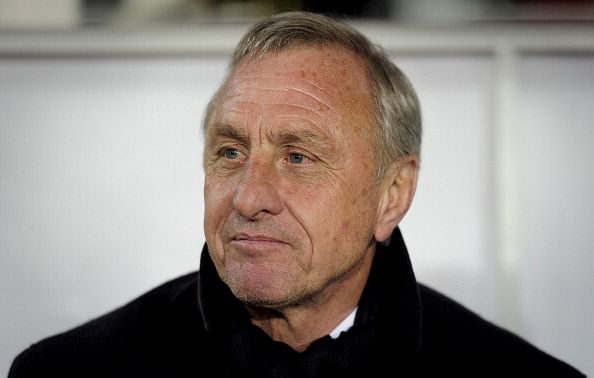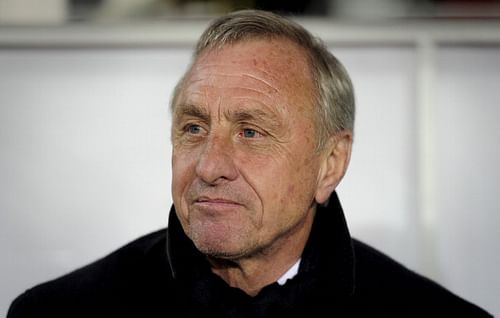
Johan Cruyff: The man who laid the foundation for the tiki-taka revolution

When Pep Guardiola was getting all the plaudits for his side’s extraordinary performances at Barcelona, there was one man, who was sitting in the stands, soaking it all in, in the background. He was the man, who took it upon himself, to change the way, one of Spain’s most historic clubs was looked at. He gave the side, the philosophy they hold true to this very day. On the face of it, he didn’t really have to do any of that.
After all, when he arrived at Barcelona, he was a triple European Cup winner and a World Cup Finalist and arguably one of the finest players the world has ever seen. But, this is not any player we are talking about. It is Johan Cruyff. A man who seemingly made the task of impossible, seem very mundane. And when he first arrived at Barcelona as a player, he was intent on making a mark on the club. And whilst his time as a player wasn’t highly successful, he still won the League and Copa del Rey once. But his most telling contribution to the club, was off the pitch.
At the end of Franco’s dictatorship, Josep Núñez was the president of the club, tasked with the responsibility of developing Barça into a world-class club by giving it stability both on and off the pitch. And it was for this reason that, on recommendation from Cruyff, Núñez inaugurated La Masia, Barcelona’s famed youth academy in 1979. The youth academy has since seen over 50 future Spanish internationals pass through its gates, including the man, who led, arguably one of the greatest football sides of all-time, Pep Guardiola.
It was when Cruyff returned in 1988 as a manager that the Barcelona as you see today, was truly born. Cruyff was, in the eyes of the world, a visionary, a man who perfected “total football” and came to Barcelona with this idea of making his dream, a reality. When Cruyff returned to the club as manager, he began assembling a Dream Team, with a mix of Spanish players like Pep Guardiola, José Mari Bakero, and Txiki Begiristain and international stars such as Ronald Koeman, Michael Laudrup, Romário, and Hristo Stoichkov.
Under his tutelage, Barcelona won four consecutive La Liga titles from 1991 to 1994 and won their first European Cup in 1992 at Wembley. His eight-year reign, saw him become the club’s longest consecutive serving manager and the most successful one as well, with 11 trophies, a record he proudly held until it was taken away from him, by his protégé Guardiola.
But, it was not the success on the pitch that transformed Barcelona, it was the way in which it was achieved. The term tiki-taka, which is used to describe the play of Barcelona and Spain right now, originated, during Cruyff’s reign as manager. His philosophy of the game, his conviction and his belief in an almost puritanical way of playing football, helped transform Barcelona, from a club which was successful domestically into one that was now known all over the World.
Cruyff’s reign as manager was the beginning of what has come to be known as the “Dutch influence” at Barcelona, and it was the style of play, he effectively introduced, that was the seeds that he had sown for their success in the past decade or so. Barcelona owe an awful lot to his Dutchman, whose passion for the game, and love for Barcelona has helped transform the fortunes of not just a club, but also created an identity for an entire nation, in Catalonia.
As Guardiola rightly put it “He’s very special to us (Catalonia) and throughout my career, I’ve simply tried to instil what I learned from Johan Cruyff.” And that has certainly served the Catalan well, so far. And whilst everyone talks about Guardiola and all that he has accomplished, one should never forget Cruyff and the contribution he made, to transform the fortunes of a club, which was struggling at the onset of Spain’s transition to democracy.
One should never forget that, it was Cruyff, who laid the foundation for the tiki-taka revolution and anything Barça achieve now, would never have been possible without him.